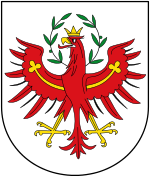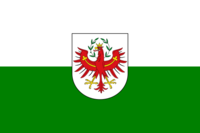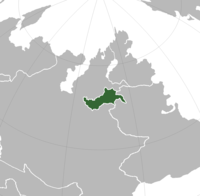Portal:Tirol

Éila! Benvedù te L Tirol!
Tirol, officially the Free State of Tirol is the smallest nation in continental Ecros. Tirol is bordered to the north by the Glaceis Ocean and to the east by the Serene State of Quebecshire. As of 2021, Tirol has an estimated population of 29 million, making it the second least populous in the world.
The Margraviate of Tirol was established in 1456 following the establishment of the Royal Diet in which the lords of the five Tiroler kingdoms of the pentarchy swore fealty to the Margraves of Innsbruck. Despite civil unrest in the following centuries, the Margraviate remained in union with the autonomy of the lords being eroded throughout until the formation of the Kingdom of Tirol in 1655.
Throughout the next two centuries there were numerous fluctuations in the boundaries of the kingdom. In 1742, the House of Fanes, the original ruling dynasty of the Kingdom paternal line became extinct, the cadet branch, the House of Cerneu inherited the throne, and would hold the position until the abolition of the monarchy in the Constitutional Convention of 1893. In 1890, the Tiroler Civil War began in which Republicans sought to overthrow King Kristian of Tirol. A three year stalemate was broken by the January Mutinee led by Archduke Frederic which resulted in a Republican victory and the establishment of the Free State of Tirol and the abolition of the monarchy in the 1893 Constitution.
The Tiroler economy is largely agricultural, with farming still being the largest sector of employment. Crude oil extraction and precious metals make up the largest proportion of the GDP, with gold in particular accounting for the plurality of the sector, however, a large and mostly untapped hydroelectric resource has been broadly suggested as a green and sustainable resource for exploitation. The official currency of Tirol is the Tiroler Schilling since 1893, when it replaced the Curona (crown).
- Manuel Nöia captain of the Tirol national football team has broken the national record for number of appearances for the national team in the course of the 2021 Ecros Championship.
- Premier Ulrike Kindle announced on the 6th June 2021 that the government will increase investment in spaceports in Provinzia Ziller.
- ...that Tirol is one of the least populous nations in Terraconserva?
- ...that Tirol uses the Schilling as its currency?
- ...that the Tiroler Civil War was fought between 1890 and 1893?
- ...that Tirol used to be a monarchy before 1893?
- ...that the primary language of Tirol is Ladin?
List of selected articles
|
|---|

The Tiroler Civil War was a civil war in Tirol between 1890 and 1893 fought to overthrow the Kingdom of Tirol and depose the House of Cerneu. The war was fought between the Republicans, divided between numerous groups with two central command structures under the Socialists and the Liberals, and the Monarchists who supported the status quo ante bellum under Kristian II. The Socialists were composed primarily of the working classes from the rapidly expanding urban centres of Tirol, they sought the abolition of the monarchy alongside the establishment of a socialist state. The Liberals had prior to the war throughout the 1880s supported the establishment of a constitutional monarchy, however, following the ascension of Kristian to the throne, and the illiberal and absolutist policy that accompanied his reign, the majority, who were primarily middle or upper class joined in advocating the abolition and the establishment of a free state.
In the years before the conflict, Tiroler society had experienced rapid population growth, industrialisation, and the rise of a comprehensive labour movement. The country's political and government systems were in an unstable phase of modernisation which was rapidly reversed with the ascension of the traditionalist Kristian. This combined with an economic downturn driven by high tariffs on Quebecshirite imports exacerbated discontent. Ultimately, on 16th May 1890 the Royal Diet petitioned the King with an ultimatum, demanding final legislative authority on matters of declaration of war, new taxes, tariffs and the judiciary. The King rejected the petition two days later, in a public address declaring it to be a mockery of the ideals Tirol was built upon, subsequently declaring martial law. Violence would first break out in Trënt where attempts to break up a miners' strike would result in the Tiroler Rifles, the commanding Lieutenant later claimed in response to a revolver in the crowd, firing upon the miners killing 12. The working classes of the city stormed the Rifles headquarters in Balsan hanging the local commander Colonel Henric dl Appan from the window of the headquarters and beating the sixteen Rifles garrisoning the building to death. Read more...List of selected articles
|
|---|
| International rank code | Student officer | OF-1 | OF-2 | OF-3 | OF-4 | OF-5 | OF-6 | OF-7 | OF-8 | OF-9 | OF-10 | ||
|---|---|---|---|---|---|---|---|---|---|---|---|---|---|
| Tiroler Ground Forces | Fhr | Lt | ALt | Capt | Mjr | Lt Col | Col | GenMjr | FML | Gen | FM | ||
| Tiroler Aviation Corps | Off Cdt | Plt Off | Fg Off | Flt Lt | Sqn Ldr | Wg Cdr | Gp Capt | Air Cdre | AVM | Air Mshl | Air Chf Mshl | Mshl dla AC | |
| Tiroler Rifles | Fhr | Lt | ALt | Capt | Mjr | Lt Col | Col | GenMjr | |||||











